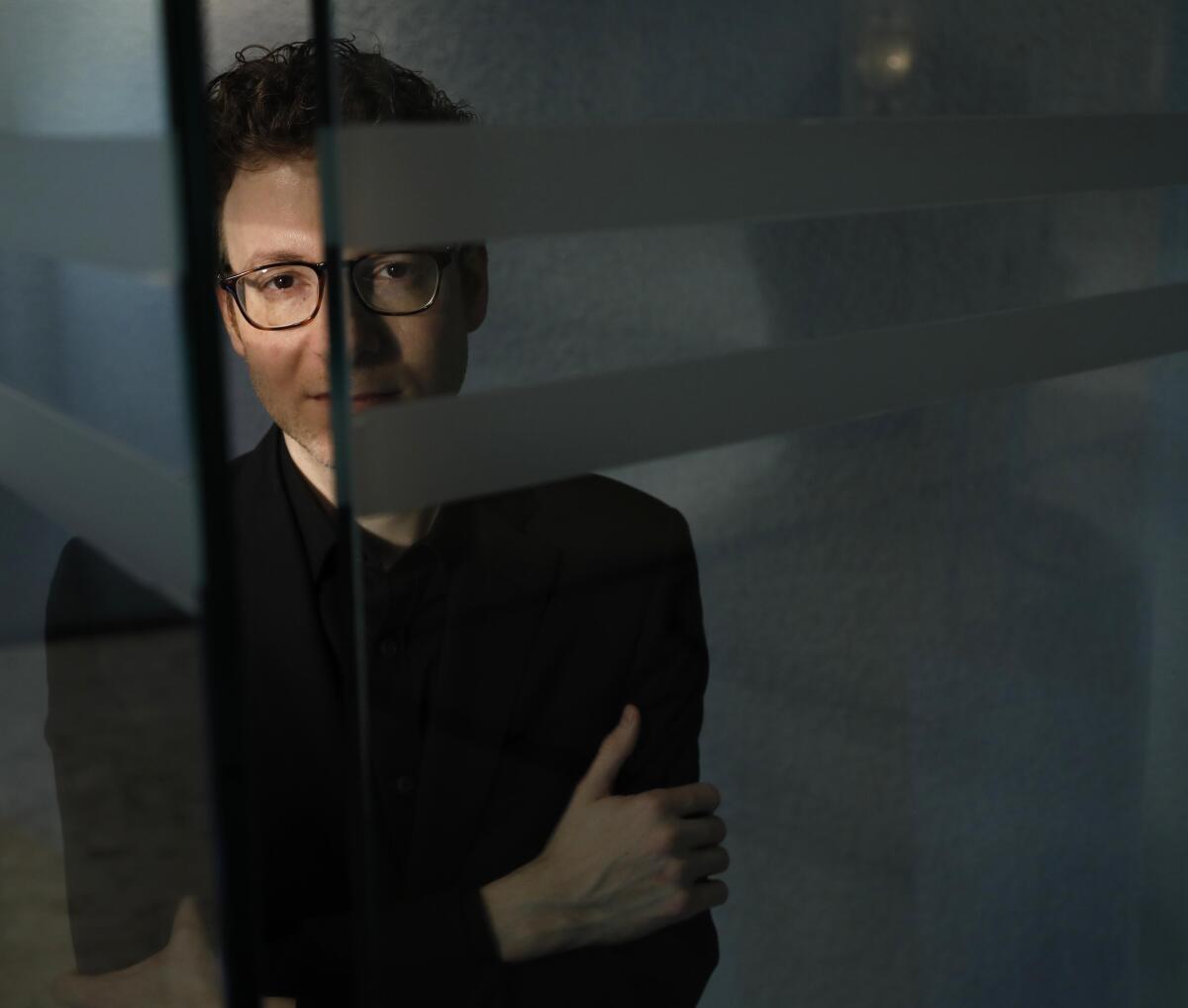Nicholas Britell finds the themes for outsized stories in this world and others

- Share via
On the planet Ferrix, a hardscrabble galactic outpost populated by metalworkers and mechanics, the local band plays music by Nicholas Britell.
In the Season 1 finale of “Andor,” musicians gather on Rix Road and march toward the center of town, where Maarva — Cassian Andor’s adoptive mother — gives her own eulogy in the form of a towering hologram. Britell, who earned an Emmy nomination for the episode, wrote the band’s multipart funeral music before he wrote anything else — the piece needed to be performed live on set.
“The props department created these instruments,” says Britell. “Those are actually musicians hired to perform on camera, so they’re real instruments that are kind of retrofitted or changed in their look, but in their function they’re still flutes and brass and percussion.”
The piece begins as a slow dirge, then accelerates into a kind of battle charge — the episode climaxes in a call to war for the latent rebels in Ferrix. “Andor” creator Tony Gilroy charged Britell with writing something that reflected the history of a people, and the composer gave a lot of thought to what kind of folk funeral music this builder culture would make. He also conceived the sounds that are produced by the giant beskar anvil — struck by a “Time Grappler” in a high bell tower — which Britell created by striking the pipes in Gilroy’s basement in Manhattan.
“Rix Road” is the culmination of several storylines, exploding into conflict and swelling with determination and hope. Britell took elements from that funeral piece and seeded them throughout his score for the whole series.
“Obviously, it’s a sad moment,” he says, “but there’s a feeling of fulfillment of an idea, hopefully.”
The music for “Andor” is as varied as the many planets the story visits. Ferrix is earthy and tactile — “the idea is, there is a truth on Ferrix about what’s going on in the galaxy,” Britell says — whereas on Morlana One, where we first meet Andor, there’s a sense of beginning and mystery. Britell, who was born in 1980, felt like analog synthesizers were appropriate there, the symbolic equivalent of a “retro past.”
His wobbly, detuned synth sound is gradually joined by a full orchestra, and at certain key moments in the series there’s a majestic sweep on a traditional “Star Warsian” scale. But the dominant thread in the score is evolution, which is typified by Britell’s Emmy-nominated main theme.
He wanted a tune “that isn’t sure of itself at first but then begins to discover itself and then vanishes just as quickly. Cassian doesn’t know who he is. He’s actually trying to find out about who he is, about his past, about his future. He’s trying to figure all of these things out at the same time, and it felt to me like there was a sense of discovery.”
The theme literally evolves in different variations during the title sequence for each episode — there’s one on cold synths, one on cellos, another on bells and textural pianos. Each planet had its own “musical ideology,” Britell says, and the transforming title theme was a fitting metaphor.
Back in our galaxy, Britell scored another funeral of sorts. The death of Logan Roy came as an enormous shock in the third episode of the final season of “Succession,” and Britell needed to help with that emotional rug-pull.
So much of his music for the acclaimed HBO series has been from a more ironic vantage point — hip-hop swagger and neoclassical posturing — but when the four Roy siblings learn their father is dead, Britell’s music went to an entirely new place, scoring the pit-in-stomach bewilderment of their sudden grief.
“That phone call when they learn what’s going on — that incredibly emotional and traumatic phone call — none of the music I’d ever done for ‘Succession,’ not texturally, not emotionally, nothing was going to work for that,” he says.
He composed an anxious cloud of music that creeps in as Kendall and Roman Roy, reduced to babbling children, try to form last words for their unconscious father. A funereal organ sounds amid skittering string effects and atmospheric electronics. Hidden inside this haze: the hit “Succession” theme.
“If you break down what I’m doing there, it is actually the chords that you hear in the theme,” he says, “but they’re played totally differently, and they have all these rubs and wrong notes in them, sort of broken in a sense.”
The episode ends on a lonely airplane tarmac, with a solo piano playing another of Britell’s themes and then a more impassioned elegy for organ and orchestra. As typically funny and acidic as it was, “there was this very, very profound sadness in this season for me,” Britell says. “I was really moved to tears at times,” he adds, “so I think that was something I was trying to express musically.”
More to Read
Sign up for The Envelope
Get exclusive awards season news, in-depth interviews and columnist Glenn Whipp’s must-read analysis straight to your inbox.
You may occasionally receive promotional content from the Los Angeles Times.









